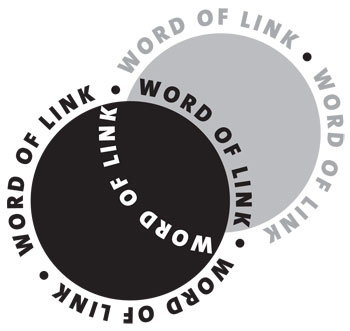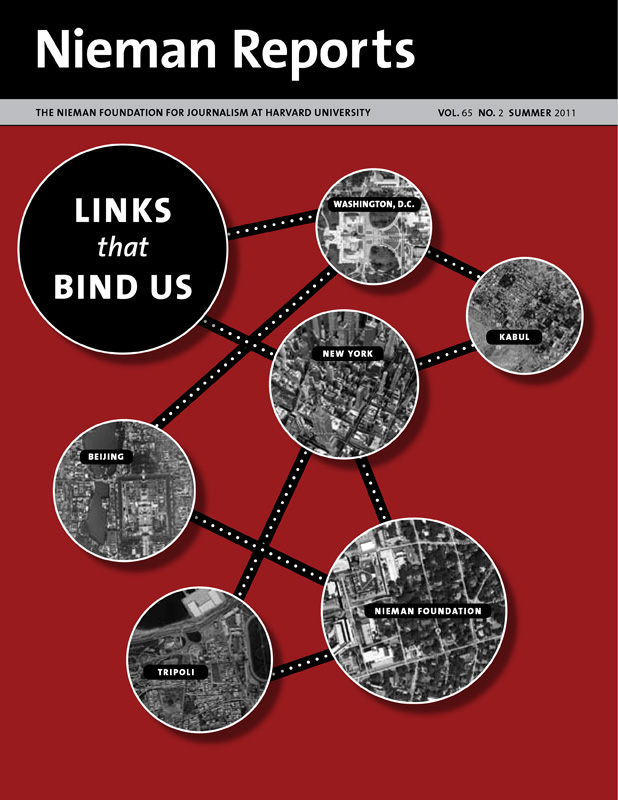 |
Information, news, recommendations and yes, gossip, have always been spread by word of mouth. In the digital age when people share such things, the result is more immediate, expansive and powerful—and how it happens depends a lot less on conversation and more on the links we send. On Facebook, Twitter, YouTube and LinkedIn, the reigning method is "word of link," and this strategy also thrives in e-mails and on blogs and websites devoted to publishing news and journalism.
Those "share" buttons on stories and blog posts do get clicked.
Distribution—passing along what's of interest through personal networks—is only the beginning of our community-building impulse. Collaborative journalism happens with a click as readers, listeners and viewers enlist themselves to be ambassadors for those who report, write and produce the news.
How we function in digital communities isn't just changing journalism's ecosystem; it is having a profound effect on how business works—and this includes journalists.
"At its core, social media requires that business leaders start thinking like small-town shop owners," Gary Vaynerchuk writes in his new book, "The Thank You Economy." "They're going to have to take the long view and stop using short-term benchmarks to gauge their progress. They're going to have to allow the personality, heart, and soul of the people who run all levels of the business to show."
If he's right—and I believe he is—radical transparency (yes, more radical than what's already happened) lies ahead for news companies and journalists. It will involve people covering real news that will be absorbed and shared by people with others they interact with in their various digital communities.
No more being disconnected—of "us" standing apart from "them."
Like Nothing Before
Word of link's power is like nothing we've experienced before. It's about how we pass along information, share ideas, and expand business in our digital times.
Consider Groupon, one of the fastest growing companies in the history of the Web. Absorb the fact that Groupon—the community gathering let's-make-a-deal approach to digital commerce—is on pace to pull in $1 billion in sales in record time. This company didn't start advertising outside of search engines until it had millions of users and had launched in dozens of cities. (Judging by the negative reaction to its Super Bowl ad this year that was probably a good idea.) Instead, Groupon grew from an e-mail listserv in Chicago to launches in Boston, New York, and Washington, D.C. largely through word of link. Motivated to share the daily deal with friends, the customer base grew exponentially. Groupon estimates that more than half of its Web visitors come because of referrals from friends.
In the news business, few would have believed that a start-up would surpass The Wall Street Journal and The Washington Post in unique Web users in less than five years. Yet that's what The Huffington Post did. With 17 million monthly unique visitors in March, this celebrity driven website had more traffic than the Journal and Post combined and at a price of $315 million it became the property of AOL earlier this year.
Absent word of link, it's unlikely that Groupon or The Huffington Post—or Zappos or Pandora or many other digital start-ups—would have found such success so quickly.
The Referral Economy
City University of New York journalism professor Jeff Jarvis talks and writes about the "link economy," describing it as "the new currency of media." He refers to it as a "gift economy" in which "links are presents that can be given or earned but not bought."
Word of link is similar to this link economy, but it is grounded in social conventions that predate the Internet and the digital device known as links. While the link economy speaks more to the power of search algorithms and Google ads, word of link is more about the power of who is sharing the link and that person's relationship to the person or company behind the link. It's much like the product endorsement that comes from a trusted friend compared to one from a celebrity spokesperson on TV.
Research highlights a pattern that at first glance seems counterintuitive. Those who arrive at a news website because of a link posted on Facebook or Twitter are likely to stay longer and return more often than visitors who get sent there from a link found through a search engine. What is surprising about this finding is that readers who click on links from search engines are actively pursuing information, while those who get there via a social network are passive news consumers who are suddenly transformed into active ones.
The Q. and A. website Quora has been around since 2009. But last year, on the day after Christmas, the influential tech personality Robert Scoble wrote a post entitled, "Is Quora the biggest blogging innovation in 10 years?" During the preceding 10 months, Quora.com averaged 113,000 unique users per month, according to Compete. In the two months after Scoble's widely distributed post, which raced around the Web on Twitter, Facebook and blogs, Quora.com averaged 313,479 unique users.
Who shared a link makes the difference. Powerful referrals come with greater ease and frequency for news companies and journalists who have personal relationships with those whom New York University (NYU) journalism professor Jay Rosen calls "the people formerly known as the audience." And Scoble is one of the most well-connected and transparent reporters and bloggers of our time.
The average Facebook user has 130 friends and the average Twitter account has 300 followers. According to Vaynerchuk's math, that means one average user with accounts on both platforms has the potential to reach 7,740 people with a single message. That message could be a thumbs-up, one-word comment, like "interesting," and the link then piggybacks on that. Or the message could be critical or snarky, questioning the value or approach on coverage.
Authentic, personal interactions with journalists and news organizations transform passive members of an audience into active endorsers and distributors—even partners. NYU professor Clay Shirky talks about three elements that make social media powerful: the promise, the tools, and the bargain. Almost universally, news companies have made the promise of interactivity via social media by launching Facebook pages and Twitter accounts. Now the follow-through must be their use of these tools to stay true to the bargain—of maintaining genuine communication and connection.
They talk to you through their storytelling; the expectation is that you will talk back to them. And just as word of mouth worked better when deeper connections existed between those giving and receiving information, the same dynamic applies to word of link. What sets word of link apart is its accelerated speed, broader range, and potential for stronger influence.
The News Finds Me
When I'm visiting college students, I always ask where they get their news. Most shrug. I might as well have asked them where they get their food. "Everywhere," most respond. Another answer I get frequently—and it's worth remembering—is the notion that "if the news is important enough, it will find me."
Translated—if my friends think I should know, they'll tell me.
According to Facebook, the average user creates 90 pieces of content each month on the site. More than 30 billion pieces of content are shared each month, and much of that is what we call journalism. Certainly reporters want their work shared, but if they focus too much on what moves the quickest on social networks this could lead to a form of "link-bait" journalism. The audience is too smart for that; or, let's say many of us hope they are and will see through attempts to pander with sensational angles. Occasionally, of course, pandering will work, but over the long haul taking this route will damage the credibility of journalists and news organizations.
Weaving a community together is more than amassing huge numbers of Facebook fans and Twitter followers. It's a challenge of quality, not quantity. I'll take 100 people who feel they are partners rather than 1,000 followers who consider us a glorified headline service. We'll get better news tips, better feedback, and more evangelism from those 100 people—plus all those in their respective networks.
Small-town business owners rely heavily on word of mouth for marketing. By embracing this approach but with a new twist, those who gather and disseminate news will leverage word of link in ways that will expand their audience, improve their journalism, and grow their business.
Mark Briggs is author of "Journalism Next: A Practical Guide to Digital Reporting and Publishing" and "Entrepreneurial Journalism: How to Build What's Next for News," to be published by CQ Press in October. He is also the director of digital media for KING-TV in Seattle, Washington and a Ford Fellow in Entrepreneurial Journalism at The Poynter Institute. He blogs at www.journalism20.com.




